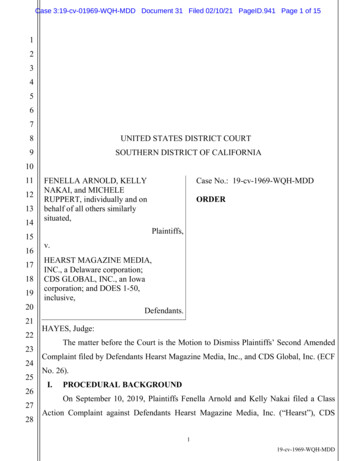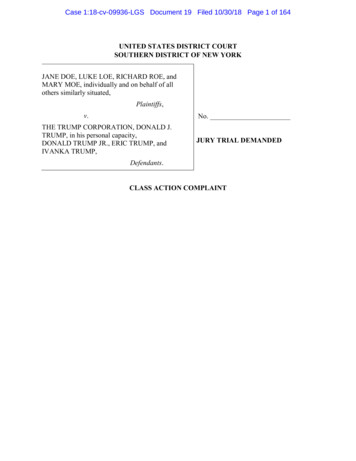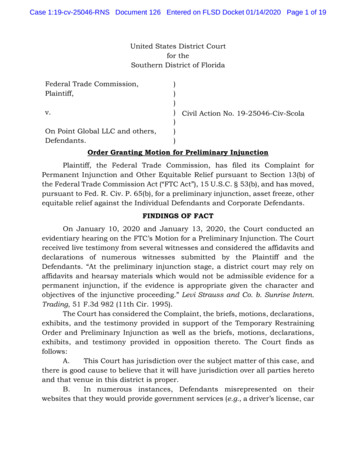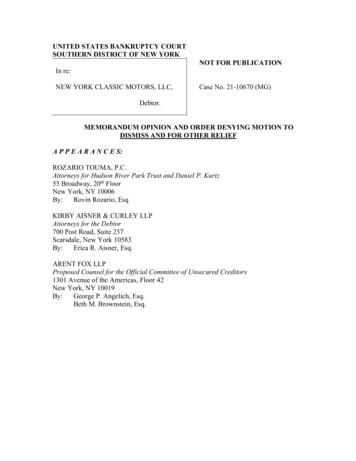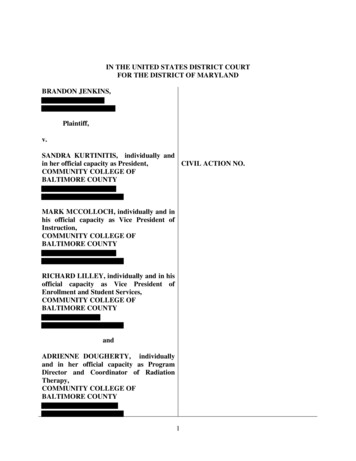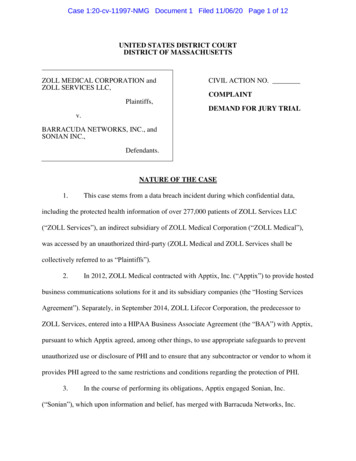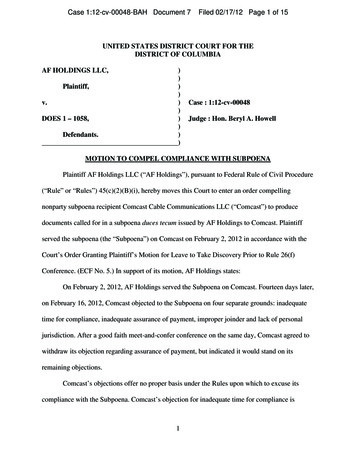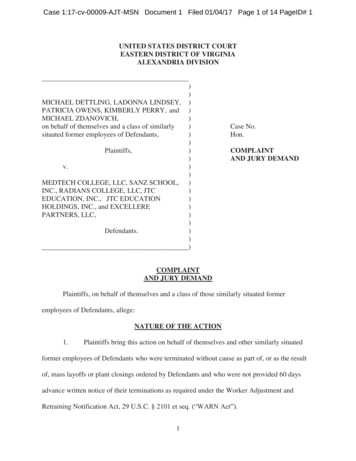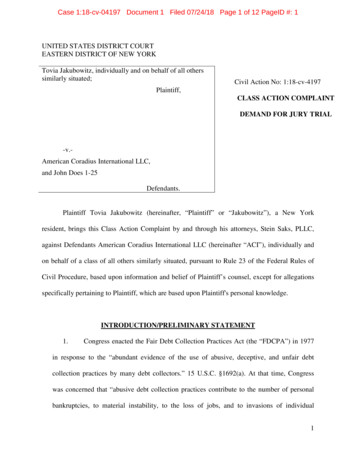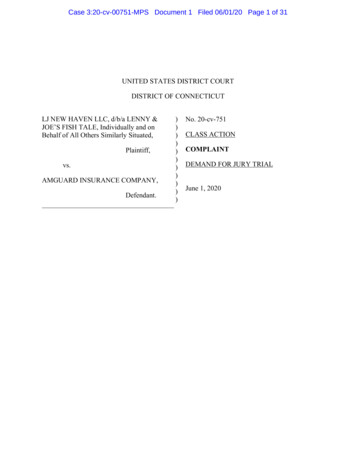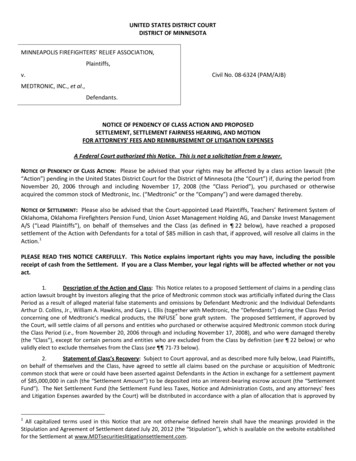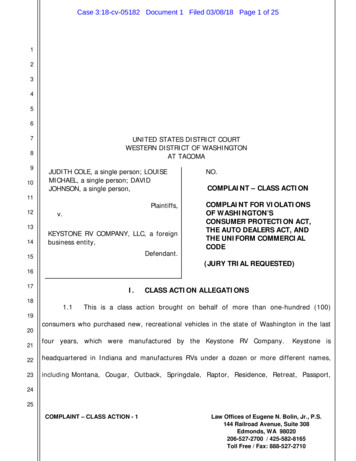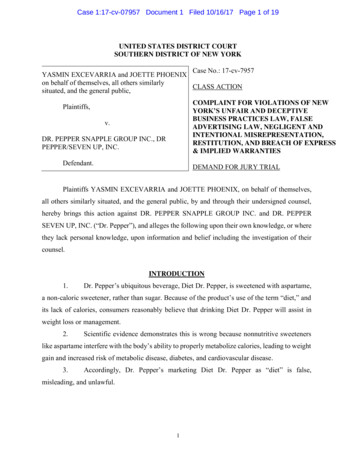
Transcription
Case 1:17-cv-07957 Document 1 Filed 10/16/17 Page 1 of 19UNITED STATES DISTRICT COURTSOUTHERN DISTRICT OF NEW YORKCase No.: 17-cv-7957YASMIN EXCEVARRIA and JOETTE PHOENIXon behalf of themselves, all others similarlyCLASS ACTIONsituated, and the general public,COMPLAINT FOR VIOLATIONS OF NEWYORK’S UNFAIR AND DECEPTIVEBUSINESS PRACTICES LAW, FALSEADVERTISING LAW, NEGLIGENT ANDINTENTIONAL MISREPRESENTATION,RESTITUTION, AND BREACH OF EXPRESS& IMPLIED WARRANTIESPlaintiffs,v.DR. PEPPER SNAPPLE GROUP INC., DRPEPPER/SEVEN UP, INC.Defendant.DEMAND FOR JURY TRIALPlaintiffs YASMIN EXCEVARRIA and JOETTE PHOENIX, on behalf of themselves,all others similarly situated, and the general public, by and through their undersigned counsel,hereby brings this action against DR. PEPPER SNAPPLE GROUP INC. and DR. PEPPERSEVEN UP, INC. (“Dr. Pepper”), and alleges the following upon their own knowledge, or wherethey lack personal knowledge, upon information and belief including the investigation of theircounsel.INTRODUCTION1.Dr. Pepper’s ubiquitous beverage, Diet Dr. Pepper, is sweetened with aspartame,a non-caloric sweetener, rather than sugar. Because of the product’s use of the term “diet,” andits lack of calories, consumers reasonably believe that drinking Diet Dr. Pepper will assist inweight loss or management.2.Scientific evidence demonstrates this is wrong because nonnutritive sweetenerslike aspartame interfere with the body’s ability to properly metabolize calories, leading to weightgain and increased risk of metabolic disease, diabetes, and cardiovascular disease.3.Accordingly, Dr. Pepper’s marketing Diet Dr. Pepper as “diet” is false,misleading, and unlawful.1
Case 1:17-cv-07957 Document 1 Filed 10/16/17 Page 2 of 194.Plaintiffs bring this action on behalf of themselves, other Diet Dr. Pepperconsumers, and the general public, to enjoin Dr. Pepper from continuing to misleadinglyadvertise Diet Dr. Pepper, and to recover restitution and damages for the class.INTRADISTRICT ASSIGNMENT5.Pursuant to Local Civil Rule 50.1(d)(2)(b)(1), this action is properly assigned tothe Manhattan Courthouse, because, as further set forth herein, a substantial part of the events oromissions giving rise to the claims occurred in New York County.THE PARTIES6.Plaintiff YASMIN EXCEVARRIA is a resident of Kings County, New York.7.Plaintiff JOETTE PHOENIX is a resident of Kings County, New York.8.Dr. Pepper Snapple Group, Inc. is a Delaware corporation with its principal placeof business at 5301 Legacy Drive, Plano, Texas 75024.9.Dr. Pepper/Seven Up, Inc. is a Delaware corporation with its principal place ofbusiness at 5301 Legacy Drive, Plano, Texas 75024.JURISDICTION AND VENUE10.This Court has jurisdiction over this action pursuant to 28 U.S.C. § 1332(d)(2)(A),the Class Action Fairness Act, because the matter in controversy exceeds the sum or value of 5,000,000 exclusive of interest and costs, at least one member of the class of plaintiffs is acitizen of a State different from Dr. Pepper. In addition, more than two-thirds of the members ofthe class reside in states other than the state in which Defendant is a citizen and in which thiscase is filed, and therefore any exceptions to jurisdiction under 28 U.S.C. § 1332(d) do not apply.11.The Court has personal jurisdiction over Dr. Pepper because Dr. Pepper isauthorized to transact business in New York by the Department of State. Further, Dr. Pepperadvertised, marketed, distributed, offered for sale, and sold its product Diet Dr. Pepper toconsumers in New York and the United States, transacting business in New York County, in NewYork, and throughout the United States, including without limitation through extensive on-theshelf presence in New York County, and online marketing intended to reach consumers in NewYork County. Moreover, Dr. Pepper has sufficient purposeful, systematic, and continuousminimum contacts with the various states of the United States, including New York, and has2
Case 1:17-cv-07957 Document 1 Filed 10/16/17 Page 3 of 19sufficiently availed itself of the markets of various states of the United States, including NewYork, to render the exercise of personal jurisdiction by this Court permissible.12.Venue is proper in this Southern District of New York pursuant to 28 U.S.C. §1391(b) and (c), because a substantial portion of the acts forming the basis for the claims occurredin this district, and because Dr. Pepper transacts substantial business generally in this district.FACTSA.Diet Dr. Pepper is Marketed to Assist in Weight Loss and Healthy WeightManagement Due to Its Non-Caloric Artificial Sweetener, Aspartame13.Dr. Pepper uses the term “diet” in Diet Dr. Pepper, on both its label and inadvertising.14.Dictionary definitions of the term “diet” commonly refer to weight loss.15.Dr. Pepper uses the term “diet” to market Diet Dr. Pepper because the product issweetened with a non-caloric artificial sweetener, aspartame, rather than sugar. Because arepresentation that a product is “diet” inherently and necessarily implies it will assist in weightloss, Dr. Pepper’s implicit promise is that, because Diet Dr. Pepper does not contain calories, itwill assist in weight loss, or at least health weight management, i.e., will not cause weight gain(in the same way that drinking water could not possibly result in weight gain).16.Due to the prominent use of the term “diet” in the product’s name, Diet Dr.Pepper, consumers reasonably believe that the product will assist in weight loss, or at leasthealthy weight management, for example, by not causing weight gain.B.Aspartame Causes Weight Gain17.Artificial, nonnutritive sweeteners were first introduced in the early 20th century,and thus humans have been consuming them for only about a century. They are typically 300 13,000 times sweeter than sugar.18.Although aspartame does not contain calories, scientific research demonstratesthat it, like other nonnutritive sweeteners, is likely to cause weight gain.19.A 2009 review article found that the “addition of [nonnutritive sweeteners] to dietposes no benefit for weight loss or reduced weight gain without energy restriction,” and noted3
Case 1:17-cv-07957 Document 1 Filed 10/16/17 Page 4 of 19“long-standing and recent concerns that inclusion of [nonnutritive sweeteners] in the dietpromotes energy intake and contributes to obesity.” 120.Another review article, in 2010, found that “[d]ata from large, epidemiologicstudies support the existence of an association between artificially-sweetened beverageconsumption and weight gain in children.”221.Another review article from 2010 said “research studies suggest that artificialsweeteners may contribute to weight gain.”322.A 2013 review article by a federally-funded Purdue University researcher, SusanE. Swithers, assessed differences between diet soda consumers and non-consumers among over450,000 participants across 14 independent prospective cohort studies, with an average 16-yearfollow-up. Swithers found that “accumulating evidence suggests that frequent consumers ofthese sugar substitutes may also be at increased risk of excessive weight gain, metabolicsyndrome, type 2 diabetes, and cardiovascular disease,” and that “frequent consumption of highintensity sweeteners may have the counterintuitive effect of inducing metabolic derangements.”She further stated that “[r]ecent data from humans and rodent models have provided little supportfor [artificially sweetened beverages] in promoting weight loss or preventing negative healthoutcomes such as [type 2 diabetes], metabolic syndrome, and cardiovascular events. Instead, anumber of studies suggest people who regularly consume [artificially sweetened beverages] areat increased risk comparted to those that do not consume [artificially sweetened beverages],” and“with the magnitude of the increased risks similar to those associated with [sugar-sweetenedbeverages].”423.A 2014 study found that “consumption of commonly used non-caloric artificialsweetener] formulations drives the development of glucose intolerance through induction ofcompositional and functional alterations to the intestinal microbiota,” and because of this “link[between] [non-caloric artificial sweetener]consumption, symbiosisand metabolicMattes RD, et al., “Nonnutritive Sweetener Consumption in Humans: Effects on Appetite and Food Intake andTheir Putative Mechanisms.” Am. J. Clin. Nutr., Vol. 89, No. 1, pp. 1-14 (Jan. 2009).2Brown RJ, et al., “Artificial Sweeteners: a Systematic Review of Metabolic Effects in Youth.” Int’l J. of Ped.Obesity, Vol. 5, No. 4, pp. 305-12 (Aug. 2010).3Yang, Q., “Gain Weight by ‘Going Diet?’ Artificial Sweeteners and the Neurobiology of Sugar Cravings.” Yale J.of Bio. & Med., Vol. 83, No. 2, pp. 101-108 (June 2010) [hereinafter “Yang”].4Swithers, SE, “Artificial Sweeteners Produce the Counterintuitive Effect of Inducing Metabolic Derangements.”Trends in Endocrinology & Metab., Vol. 24, No. 9, pp. 431-41 (Sept. 2013).14
Case 1:17-cv-07957 Document 1 Filed 10/16/17 Page 5 of 19abnormalities,” found that artificial sweeteners “may have directly contributed to enhancing theexact epidemic that they themselves were intended to fight.” 524.In 2015, researchers reported “a striking dose-response relationship,” wherein“increasing [diet soda intake] was associated with escalating abdominal obesity, a pathway forcardiometabolic risk,” and noted that “[h]igh incidences of overweight and obesity,hypertension, metabolic syndrome, diabetes mellitus, kidney dysfunction, heart attack, andhemorrhagic stroke have all recently been associated with frequent [nonnutritive sweetenerintake] and [diet soda intake].”625.Epidemiological studies also implicate artificial sweeteners in causing weight26.For example, the San Antonio Heart Study “observed a class, positive dose-gain.response relationship between [artificially sweetened] beverage consumption and long-termweight gain,” and found that consuming more than 21 artificially sweetened beverages per week,compared to those who consumed none, “was associated with almost-doubled risk” ofoverweight or obesity. 727.A study of beverage consumption among children and adolescents aged 6-19found that “BMI is positively associated with consumption of diet carbonated beverages.” 828.A two-year study of 164 children found that “[i]ncreases in diet soda consumptionwere significantly greater for overweight and subjects who gained weight as compared to normalweight subjects.”929.A July 2017 study found that artificial sweeteners did not lead to any significantweight loss in more than 1,000 participants in seven clinical trials. At the same time, combinedSuez J, et al., “Artificial Sweeteners Induce Glucose Intolerance by Altering the Gut Microbiota.” Nature, pp.18186 (Oct. 2014).6Fowler, S, et al., “Diet Soda Intake is Associated with Long-Term Increases in Waist Circumference in a BiethnicCohort of Older Adults: The San Antonio Longitudinal Study of Aging.” J. of the Am. Geriatrics Society (March 17,2015).7Fowler, S, et al., “Fueling the Obesity Epidemic? Artificially Sweetened Beverage Use and Long-Term WeightGain.” Obesity, Vol. 16, No. 8, pp. 1894-900 (Aug. 2008).8Forshee RA, et al., “Total Beverage Consumption and Beverage Choices Among Children and Adolescents.” Int’lJ. of Food Sci. & Nutr., Vol. 54, No. 4, pp. 297-307 (July 2003); see also Berkey CS, et al., “Sugar-Added Beveragesand Adolescent Weight Change.” Obesity Research, Vol. 12, No. 5, pp. 778-88 (May 2004) (in study of more than10,000 U.S. children aged 9-14, finding, for boys, intakes of diet soda “were significantly associated with weightgains”).9Blum, JW, et al., “Beverage Consumption Patterns in Elementary School Aged Children Across a Two-YearPeriod.” J. of Am. Coll. of Nutr., Vol. 24, No. 2, pp. 93-98 (Apr. 2005).55
Case 1:17-cv-07957 Document 1 Filed 10/16/17 Page 6 of 19data from 30 observational studies involving more than 400,000 participants showed thatartificial sweeteners are associated with obesity, high blood pressure, type 2 diabetes and hearthealth problems.1030.A study published in August 2017 suggested artificial sweetener use increases therisk of type 2 diabetes by 21%, which is about half the increased risk seen with sugar-sweetenedbeverage use, at 43%.11 Another study indicates daily diet soda consumption is associated witha 36% increase in risk of metabolic syndrome, and a 67% increase in risk of type 2 diabetescompared with non-drinkers.1231.Recent research, published in August 2017, suggests the likely mechanism of thecounterintuitive effect of non-caloric sweeteners contributing to weight gain and other chronic,metabolic illness.32.In nature, sweetness signals energy. Generally, the greater the sweetness, themore calories that are available, so the human brain has evolved to expect the two to cometogether. When they do not, the brain can become confused, thinking there are fewer calories toburn. That is, artificial sweeteners, including aspartame, appear to promote weight gain, and totrigger metabolic syndrome and diabetes, because the brain misreads the number of caloriespresent and reduces metabolism, resulting in more calories being stored in the body.33.This recent research came about when Yale University researcher Dana Small setout to determine whether the rewarding character of sweet foods was due to the calories thosefoods contain. Small created five beverages. Each was sweetened with sucralose, an artificialsweetener, to taste about as sweet as a drink containing about 75 calories of sugar. Small thenvaried the calories by adding different amounts of a tasteless carbohydrate called maltodextrin,so that the five beverages contained 0, 27.5, 75, 112.5, and 150 calories. After subjects consumedeach drink six times over a period of weeks, Small scanned their brains to see how each affectedbrain reward circuits, expecting that the higher-calorie drinks would stimulate a stronger rewardAzad, MB, et al., “Nonnutrive sweeteners and cardi
dr. pepper snapple group inc., dr pepper/seven up, inc. defendant. case no.: 17-cv-7957 class action complaint for violations of new york’s unfair and deceptive
